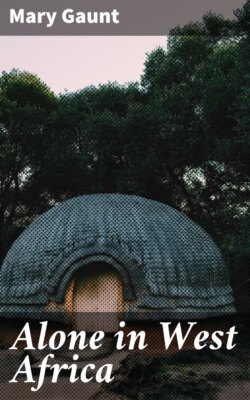Читать книгу Alone in West Africa - Mary Gaunt - Страница 12
На сайте Литреса книга снята с продажи.
Оглавление
There were some Mandingo chiefs here. Bala, Chief of Kantora, and Jimbermang Jowlah, the local Chief, came to call. Bala dashed up on horseback, with a large following, to complain that there was trouble on the Border, for the French had come in and said that his town should pay a poll tax of 500 dollars. He ranged all his horses, with their high cantled saddles and their heavy iron stirrups, on the steep, red bank, and he and his chief man came on board the little steamer to talk to the Commissioner. They made a quaint picture—the fair, good-looking Commissioner, with his boyish face grave, as suited the occasion, and the Chief, a warrior and a gentleman, as unlike Mr. Jonsing in his tourist cap as the Gambia is unlike the Thames at Wapping. The Commissioner wore a blue-striped shirt and riding breeches, and the Chief was clad all in blue of different shades; there was a sort of underskirt to his knees of dark-blue cotton patterned in white, over that was a pale-blue tunic, through which came his bare arms, and over that again a voluminous dark-blue cotton garment, caught in at the waist with a girdle, from which depended a very handsome sporran of red leather picked out in yellow; on his bare feet were strapped spurs, a spur with a single point to it like a nail. He had a handsome, clean-cut face, his shaven head was bared out of courtesy, and at his feet lay his headgear, a blue-velvet cap, with a golden star and crescent embroidered upon it, and a great round straw hat adorned with red leather such as the Hausas farther east make. He was a chief, every inch of him. And his manners were those of a courtly gentleman too. He did not screech and howl like the men on the wharf, though he was manifestly troubled and desperately in earnest; but, sitting there on the deck of the little steamer, with the various odds and ends of life scattered around him, he stated his case, through an interpreter, to the young Commissioner seated on the hen-coop and taking down every word. When it was done he was assured that the Governor should be told all about it, and now rose with an air of intense relief. He had thrown his burden on responsible shoulders, and had time to think about the white woman who was looking on. He had seen white men before, quite a number, but never had he seen a white woman, and so he turned and looked at me gravely, with not half the rude curiosity with which I felt I had been steadily regarding him. I should like to have been a white woman worth looking at, instead of which I was horribly conscious that the coal dust was in my hair, that my hands had but recently grasped the greasy handrail of those steps across the boiler, and that my skirts had picked up most of the multifarious messes that were to be gathered there and on the unclean deck. There is no doubt skirts should not come much below the knees in the bush.
“He wishes to make his compliments to you,” said the interpreter, and the grave and silent Chief, with a little, low murmur, took my hand in both his delicate, cold, black ones, held it for a moment with his head just a little bent, and then went his way, and I felt I had been complimented indeed.
The chief of Kantora, having done all he came to do, swam his horses across the river, trusting, I suppose, to the noise made by his numerous followers to scare away the crocodiles, and we went up the river to Kossun, which is within two miles of Yarba Tenda, where the British river ends. At Kossun there is a French factory only, and that managed by a black man, and here are the very beginnings of the groundnut trade. All around was vivid green—green on the bank, green reflected in the clear waters of the river; the sun was only just rising, the air was cool, and grey mists like a bridal veil rent with golden beams lay across the water; only by the factory was a patch of brown, enhancing the greenery that was all around it.
